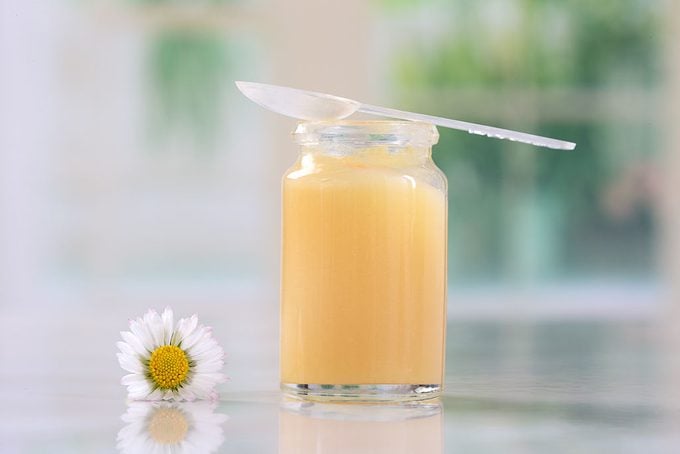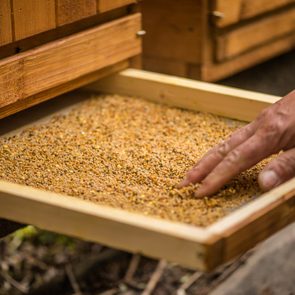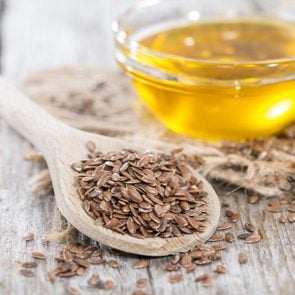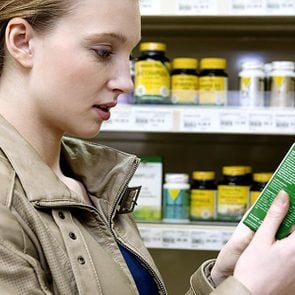Is Royal Jelly Good for You? 6 Things to Know
Updated: Jun. 29, 2021
Potential royal jelly benefits make this bee product buzzworthy. But is it worth the expense?
What is royal jelly?
Everyone’s buzzing about the benefits of bees.
They give us honey. Provide us with bee pollen. Make the beeswax we use in a bunch of beauty and household items. And, oh yeah, they pollinate the crops that allow humanity to exist.
But bee lovers might not realize there’s another gel-like substance that bees make: Royal jelly.
Unlike honey, royal jelly is naturally bitter and sour. Worker honey bees secrete the substance from their glands to feed their larvae and queens.
Although that sounds gross, the flavor doesn’t stop people from using royal jelly as a supplement to aid different health conditions. Whether or not it actually helps, however, is up for debate.
Here’s what the current research shows, what experts think about royal jelly, and everything else you need to know.

How is royal jelly different from honey?
Aside from the fact that both are made by bees, royal jelly and honey have few things in common.
For starters, there’s a stark difference in how they taste: bitter and sour (royal jelly) vs. naturally sweet (honey).
Honey is a liquid made with nectar from flowers via a multistep process involving multiple honeybees, explains registered dietitian nutritionist Malina Malkani.
Meanwhile, Malkani says, royal jelly is a milk-like substance produced by worker bees as nourishment for queen bees and their young.
Royal jelly is higher in protein and lower in sugars than honey, adds Kris Sollid, RD, senior director of nutrition communications at the International Food Information Council.
“Bee larvae and queen bees consume royal jelly exclusively because of their higher protein needs,” he says. “After a few days of life, only bees destined to become queen bees are exclusively fed royal jelly.”
Queen bees continue to only consume royal jelly (no honey, no pollen) for their entire lives.
But besides the price at the store and the specific ways bees make it, there are only a few nutritional differences between honey and royal jelly, according to Sollid.
“None [are] stark enough to be of major significance to human health,” he says.
(Here’s what to know about manuka honey.)
Royal jelly nutrition facts
Royal jelly is a combination of water, protein, sugars, lipids, and mineral salts. Sollid says that royal jelly is up to 70 percent water, whereas honey is only about 17 percent water.
That said, the exact extent of royal jelly’s makeup is unknown. And the nutrition facts vary depending on the source.
Research in Frontiers in Pharmacology found that royal jelly contains unique proteins and fatty acids. This includes nine glycoproteins, or major royal jelly proteins, and two fatty acids (trans-10-hydroxy-2-decenoic acid and 10-hydroxydecanoic acid).
It also contains B vitamins, including thiamine, riboflavin, niacin, pyridoxine, pantothenic acid, biotin, and folic acid.
People use it in gel, powder, or capsule form. But there’s no official recommended dosage for royal jelly.
Potential royal jelly benefits
Royal jelly is sold as a supplement and remedy for various ailments.
Still, clinical evidence demonstrating the beneficial effects of royal jelly on human health is lacking, according to Sollid and Malkani. The research we do have is small and needs to be supported by larger human trials.
Here’s what the available research found.
It may treat menopause symptoms
The most compelling research on royal jelly suggests that, when taken orally, it may help improve some of the symptoms associated with menopause and increase feelings of well-being in menopausal women, although more research is needed, according to Malkani.
The hormonal changes during menopause cause unwanted side effects, such as hot flashes, pain, impaired memory, depression, and anxiety.
In one study, published in Evidence-Based Complementary and Alternative Medicine, researchers followed 42 healthy Japanese postmenopausal women for 12 weeks. Those who took (orally) 800 milligrams of royal jelly powder reduced their back pain and anxiety without any unwanted side effects.
Another study, published in Gynecological Endocrinology, found that 36 postmenopausal women who took 150 milligrams of royal jelly daily for three months improved their cholesterol levels (more on that below).
It might impact cholesterol levels
Some research has found that royal jelly supplements could reduce cholesterol levels, even in people who aren’t in menopause. Some experts believe this is because of the special proteins in royal jelly, according to PLOS ONE.
A small, month-long study published in Pharmaceutical Biology looked at 40 people with mild high blood pressure. Half of the people took nine capsules of royal jelly daily for three months.
Each capsule had 350 milligrams of royal jelly, for a total of 3,150 milligrams per day.
Researchers looked at their cholesterol levels and found that people taking daily royal jelly lowered both their total and “bad” LDL cholesterol levels.
It could regulate blood sugar
In a small, six-month study of 61 healthy people, researchers examined how royal jelly might affect fasting blood sugar in healthy individuals.
After six months, fasting glucose levels were lower in the 30 people who took 3,000 milligrams of royal jelly daily than those who took a placebo.
Another small study, published in the Chinese Journal of Integrative Medicine, looked at 50 women with type 2 diabetes and saw similar results. In this pilot study, half the women took a one-gram dose of royal jelly gel every day for eight weeks, while the other half took a placebo.
The researchers found that women who supplemented with royal jelly had lower blood glucose levels. And their levels were lower than those of women in the control group.
It might support the immune system
Royal jelly has the potential to enhance or stimulate antibodies, a natural immune response to foreign bacteria and viruses, according to research in Food Science and Nutrition.
The study is promising, but it was done in cells, so it’s very preliminary and needs a lot of additional research, particularly in humans, to back up the findings.
And a review study published in Microbiological Research found that royal jelly promoted antibacterial activity and was even effective against many multidrug-resistant bacteria. This research means the jelly may boost or support the immune system.
Other potential benefits
Animal research points to some other potential benefits of royal jelly—treating dry eye, reducing the side effects of cancer treatment, slowing signs of aging, and aiding wound healing.
But there’s not enough data to say these benefits translate to humans.
Who should avoid royal jelly?
Side effects are generally rare. “When ingested or used topically in appropriate amounts, royal jelly is generally safe for most people,” Malkani says.
The risks and side effects of royal jelly mostly have to do with the fact that it’s a bee product. People allergic to bee stings or pollen may not want to try this supplement.
“In people with asthma, allergies to bees, or a genetic predisposition to developing allergic reactions, royal jelly seems to cause an elevated rate of allergic symptoms, some of which can be severe,” Malkani says.
According to Frontiers in Pharmacology, allergic reactions include:
- Asthma
- Anaphylaxis, which causes difficulty breathing, swelling in the mouth and throat, a sudden drop in blood pressure, and sometimes loss of consciousness
- Contact dermatitis, a red, itchy rash caused by coming into contact with something you’re allergic to
People who are pregnant or breastfeeding should also avoid royal jelly, as there is currently not enough reliable evidence to know whether it is safe for this population, Malkani notes.
If you take certain herbal supplements or prescription drugs that thin the blood or lower blood pressure, talk to your doctor before taking royal jelly.
It’s always a good rule of thumb to talk to your doctor or pharmacist before adding any supplement.
What experts think about royal jelly
Malkani generally doesn’t recommend royal jelly, although she frequently recommends and uses honey in recipes and cooking because of its potential health benefits, amazing flavor, and texture.
Sollid also notes that honey is much less expensive than royal jelly.
And if you’re looking for ways to improve your health, there are many ways to do so. It might not be worth adding an expensive supplement to your diet, given the lack of research.
Still, if you are considering taking royal jelly, Sollid recommends consulting your health care provider first. As with all dietary supplements, read the label carefully and use it as directed.
Next, check out the natural health benefits of honey.
























